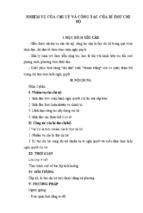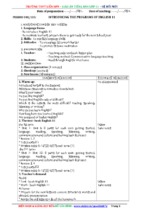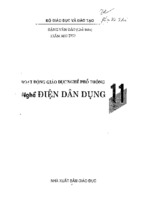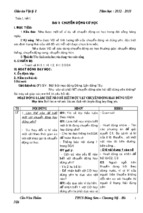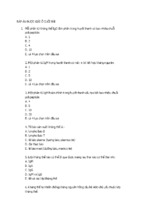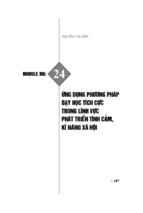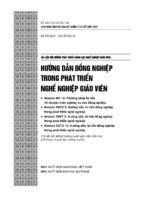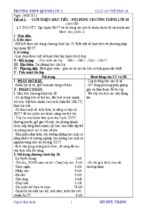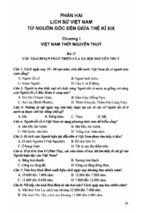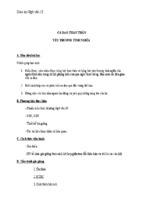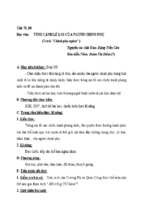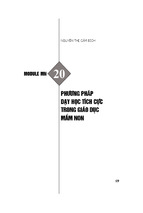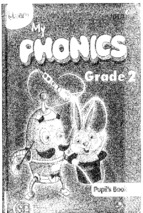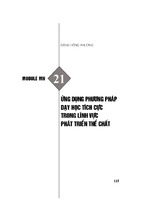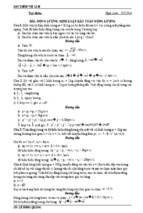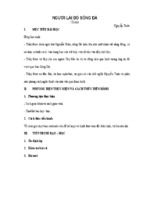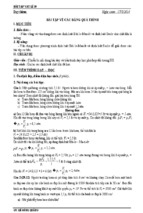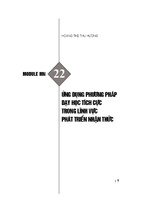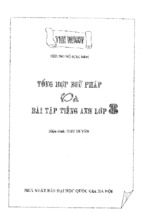Tuyển tập đề thi hsg tiếng anh lớp 10
SỞ GIÁO DỤC VÀ ĐÀO TẠO
HÀ TĨNH
KỲ THI CHỌN HỌC SINH GIỎI TỈNH CẤP THPT
NĂM HỌC 2012 - 2013
Môn thi: TIẾNG ANH 10
Thời gian làm bài: 180 phút
(Đề thi có 08 trang, gồm 11 phần)
ĐỀ CHÍNH THỨC
Lưu ý:
→
→
→
→
Thí sinh không sử dụng bất kể tài liệu nào, kể cả từ điển.
Thí sinh làm bài trực tiếp vào đề thi, ghi câu trả lời vào các ô cho sẵn ở cuối các phần.
Riêng phần trắc nghiệm thí sinh chỉ ghi đáp án A, B, C hoặc D vào ô cho sẵn.
Giám thị không giải thích gì thêm.
Điểm của toàn bài thi
(Bằng số)
(Bằng chữ)
Các giám khảo
Số phách
(Ký và ghi rõ họ tên)
(Do Trưởng Ban chấm thi ghi)
Giám khảo 1:
Giám khảo 2:
A. LISTENING
PART I. Listen to the dialogue on the phone between and a man and a girl named Juliet and fill in the
form. You are allowed to listen TWICE. Give your answers in the numbered spaces.
Name:
Juliet A. Eastman
Age:
(1) ……………………………………
Hair color:
(2) ……………………………………
Eye color:
(3) ……………………………………
Height:
(4) ……………………………………
Occupation:
(5) …………………………………… …………………………………………………………..
Likes:
going out and having fun, sports, (6) ………………………………………
and (7) ……………………………………………
Wants to meet someone who : (8) …………………………………………………, likes same
(9)………………………………………………. and (10) ………………………………………
Part II. You are going to hear an expert talk about sleeping and dreaming. Listen and write True (T) or
False (F) for each sentence. You are allowed to listen TWICE.
Your answers
True (T)
1. Women sleep more than men.
2. A sound sleeper moves less than a light sleeper.
3. Most people need 9 hours of sleep a night.
4. Reading in bed helps you sleep.
1
False (F)
5. Some people don’t dream at all.
6. The average person has about four dreams a night.
7. Not everyone can remember his or her dreams.
8. Eating before bed can give you nightmares.
PART III. You are going to listen to a talk about Margaret Mead. Listen and choose the best answer A,
B, C or D for each question. You are allowed to listen TWICE.
1. What was Margaret Mead’s job?
A. a photographer
B. a biologist
C. an anthropologist
D. a journalist
2. What was Margaret Mead’s main interest?
A. taking photographs
B. exploring new places
C. how children were looked after.
D. living in pour areas.
3. When did Margaret Mead go to Samoa?
A. in 1901.
B. in the 1920s.
C. in 1938.
D. in 1978.
4. Who did she interview in her first trip to Samoa?
A. girls between 9 and 20 years old.
B. boys and girls between 9 and 20 years old.
C. women over 20 years old.
D. men and women over 20 years old.
5. What was the title of Margaret Mead’s book?
A. The pacific Islands.
B. Teenagers around the World.
C. Growing Up in New Guinea.
D. Coming of Age in Samoa.
6. What was the main reason why Margaret Mead took photos?
A. She liked photography.
B. Cameras were not very common at that time.
C. Her husband liked photos.
D. It was the best way to share what she learned.
7. What is the main topic of the listening passage?
A. Margaret Mead went to college in New York.
B. Margaret Mead did research on the role of culture.
C. Margaret Mead took photographs and wrote books.
D. Margaret Mead was born in Philadelphia.
Your answers
1.
2.
3.
4.
5.
6.
7.
B. LEXICO – GRAMMAR
PART IV. Choose the answer A, B, C or D which best fits the space in each of the following sentences.
1. _________ saying was so important that I asked everyone to stop talking and listen.
A. What the woman was
B. That the woman was
C. The woman was
D. When was the woman
2. -“Do you mind if I take a seat?”
- “_____________.”
A. Yes, I don’t mind
B. No, do as you please
C. No I mind
D. Yes, do as you please
3. As the two teams left the football ground, the 100,000 _________ gave them a standing ovation.
A. bystanders
B. spectators
C. viewers
D. audiences
4 My parents lent me the money. _________, I couldn’t have afforded the trip.
A. However
B. Therefore
C. Only if
D. Otherwise
5. It is interesting to take _________ a new hobby such as collecting stamps or going fishing.
A. over
B. on
C. in
D. up
6. Jack made me _________ him next week.
A. promise calling
B. to promise calling
C. to promise to call
D. promise to call
2
7. “I passed the TOEFL test, Mom.”
- “ _________.”
A. All right
B. Thank you
C. Well done
D. Good luck
8. The bad weather caused serious damage to the crop. If only it _______ warmer.
A. was
B. were
C. has been
D. had been
9. - “Eric is really upset about losing his job.” - “ Well, ____once myself, I can understand.”
A. Having been fired
B. Fired
C. Having fired
D. Being fired
10. ________ you, I’d think twice about that decision. I could be a bad move.
A. Were I
B. Should I be
C. If I am
D. If I had been
11. The teacher asked a difficult question, but finally Ted _________ a good answer.
A. put up with
B. keep pace with
C. made way for
D. came up with
12. Not only ________ to speak to him, but she also vowed never to see him again.
A. she refused
B. did she refuse
C. she did refuse
D. when she refused
13. The judge ________ the pedestrian for the accident.
A. accused
B. charged
C. caught
D. blamed
14. She had to borrow her sister’s car because hers was _________.
A. out of work
B. out of order
C. on duty
D. off work
15. We should participate in the movement _________ to conserve the natural environment.
A. to organize
B. organizing
C. which organized
D. organized
16. His brother refuses to even listen to anyone else’s point of view. He is very_________.
A. open-minded
B. kind-hearted
C. narrow-minded
D. absent-minded
17. There is _________ in my bedroom.
A. a square wooden old table
B. an old square wooden table
C. a wooden old square table
D. an old wooden square table
18. “I am sorry. I broke the vase”.
- “ _________.”
A. OK. Go ahead
B. Yes, certainly
C. Don’t worry. Things break
D. I’d rather not.
19. One’s fingerprints are _________ other person.
A. different from
B. different from any
C. differ from any
D. different from those of any
20. He is very happy because he passed his exam with __________ colours.
A. flying
B. failing
C. imagining
D. changing
Your answers:
1.
2.
3.
4.
5.
6.
7.
8.
9.
10.
11.
12.
13.
14.
15.
16.
17.
18.
19.
20
PART V. From four underlined parts, choose the one that needs correction then correct it.
For example : The teacher did not allow the students discussing the take-home exam with each other.
discussing → to discuss
1. A Geiger counter is an electronic instrument is used to measure the presence and intensity of radiation.
2. A dolphin locates underwater objects in their path by making a series of clicking and whistling sounds.
3. In spite of its small size, Europe had a great impact on world history than other continents.
4. Before she moved here , Alene has been president of the organization for four years.
5. That Marta's been chosen as the most outstanding student on her campus make her parents very happy.
6. My cousin composes not only the music, but also sings the songs for the major Broadway musicals.
7. Our civilization is so commonplace to us that rarely we stop to think about its complexity.
8. Ever since the world began, nations have difficulty in keeping peace with their neighbors.
3
9. Those of us who have a family history of heart disease should do yearly appointments with our doctors.
10. If one had thought about the alternatives, he would not have chosen such difficult a topic for a term paper.
Your answers
Mistake
Correction
1.
2.
3.
4.
5.
6.
7.
8.
9.
10.
PART VI. Fill in each space in the following sentences with the most suitable prepositions.
1. I'm afraid Tom's _______ work. But Jack's in. Would you like to speak to him?
2. Have you been to the theatre recently? ~ Yes, I was _______ the Old Vie last night.
3. At first I found the work very tiring, but _______ a few weeks I got used to it.
4. _______ the daytime the streets are crowded but at night they are quite deserted.
5. I saw Tom at the bus stop this morning but couldn't speak to him because we were standing _____ a queue.
6. He is always in a hurry. He drives _______ a tremendous speed.
7. Write ________ ink and put your name on the top of the page.
8. The man with the pipe and red hair is the brother of the girl ________ blue.
9. He sits at his desk all day with his head in his hands. It gets ________ my nerves.
10. The children hastily changed _______ bathing things and jumped into the river with shouts of delight.
Your answers:
1.
2.
3.
4.
5.
6.
7.
8.
9.
10.
PART VII. Give the correct form of the word in bracket to complete the passage.
Your answers:
The __1__ (say) “never judge a book by its cover” could not be more true for
Ridiculous Rules by Marjorie Allen. The cover is completely blank, whereas
1. ............................................
the book is crammed full of wonderful examples and anecdotes. Allen is an 2. ............................................
__2__ (speak) critic of what is taught to native and non-native speakers of
3. ............................................
English, and has issued a __3__ (declare) of war against textbooks and style
books which tell lies.
4.............................................
Take the ridiculous and __4__ (mean) rule of never ending a sentence
with a preposition. The lovely - if famous – story goes, that Winston Churchill, 5.............................................
well-known for his numerous __5__ (write) as well as for being British Prime
Minister during the Second World War, received a manuscript back from an
6. ............................................
ignorant __6__ (edit), who had told him rather rudely that he had to __7__ 7. ............................................
4
(phrase) a sentence which ended with a preposition. Churchill responded by
making the simple yet forceful __8__ (state) in the margin: “This is an
8. ............................................
impertinence up with which I will not put.” – the __9__ (imply) being that not 9. ............................................
to end a sentence with a preposition often sounds ridiculous in English, Sadly,
10. ............................................
Allen informs us that the story is probably mere __10__ (hear), and that
Churchill may have actually only written “rubbish!” in the margin.
C. READING
PART VIII. Read the passage and choose the best answer A, B, C, or D to each of the questions
Large animals that inhabit the desert have evolved a number of adaptations for reducing the effects of
extreme heat. One adaptation is to be light in color, and to reflect rather than absorb the Sun's rays. Desert
mammals also depart from the normal mammalian practice of maintaining a constant body temperature.
Instead of trying to keep down the body temperature deep inside the body, which would involve the
expenditure of water and energy, desert mammals allow their temperatures to rise to what would normally be
fever height, and temperatures as high as 46 degrees Celsius have been measured in Grant's gazelles. The
overheated body then cools down during the cold desert night, and indeed the temperature may fall unusually
low by dawn, as low as 34 degrees Celsius in the camel. This is an advantage since the heat of the first few
hours of daylight is absorbed in warming up the body, and an excessive buildup of heat does not begin until
well into the day.
Another strategy of large desert animals is to tolerate the loss of body water to a point that would be fatal
for non-adapted animals. The camel can lose up to 30 percent of its body weight as water without harm to
itself, whereas human beings die after losing only 12 to 13 percent of their body weight. An equally important
adaptation is the ability to replenish this water loss at one drink. Desert animals can drink prodigious volumes
in a short time, and camels have been known to imbibe over 100 liters in a few minutes. A very dehydrated
person, on the other hand, cannot drink enough water to dehydrate at one session, because the human stomach
is not sufficiently big and because a too rapid dilution of the body fluids causes death from water intoxication.
The tolerance of water loss is of obvious advantage in the desert, as animals do not have to remain near a
water hole but can obtain food from grazing sparse and far-flung pastures. Desert-adapted mammals have the
further ability to feed normally when extremely dehydrated, it is a common experience in people that appetite
is lost even under conditions of moderate thirst.
1. What is the main topic of the passage?
A. Weather variations in the desert
B. Adaptations of desert animals
C. Diseased of desert animals
D. Human use of desert animals.
2. According to the passage, why is light coloring an advantage to large desert animals?
A. It helps them hide from predators.
B. It does not absorb sunlight as much as dark colors.
C. It helps them see their young at night
D. It keeps them cool at night.
3. The word "maintaining" is closest in meaning to ___________.
A. measuring
B. inheriting
C. preserving
D. delaying
4. The author uses of Grant's gazelle as an example of ___________.
A. an animal with a low average temperature
B. an animal that is not as well adapted as the camel
C. a desert animal that can withstand high body temperatures
D. a desert animal with a constant body temperature
5. When is the internal temperature of a large desert mammal lower?
A. Just before sunrise
B. In the middle of the day
C. Just after sunset
D. Just after drinking
5
6. The word "tolerate" is closest in meaning to ___________.
A. endure
B. replace
C. compensate
D. reduce
7. What causes water intoxication?
A. Drinking too much water very quickly
B. Drinking polluted water
C. Bacteria in water
D. Lack of water.
8. What does the author imply about desert-adapted mammals?
A. They do not need to eat much food.
B. They can eat large quantities quickly
C. They easily lose their appetites.
D. They can travel long distances looking for food.
9. Why does the author mention humans in the second paragraph?
A. To show how they use camels.
B. To contrast them to desert mammals.
C. To give instructions about desert survival.
D. To show how they have adapted to desert life.
10. Which of the following is NOT mentioned as an adaptation of large desert animals?
A. Variation in body temperatures
B. Eating while dehydrated
C. Drinking water quickly
D. Being active at night.
Your answers:
1.
2.
3.
4.
5.
6.
7.
8.
9.
10.
PART IX. Read the text below and decide which answer A, B, C or D best fits each space.
When you read something in a foreign language, you frequently (1)______ across words you do not fully
understand. Sometimes you check the meaning in a dictionary and sometimes you (2)______. The strategy
you adopt depends very much upon the (3)______ of accuracy you require and the time at your disposal.
If you are the sort of person who tends to turn to the dictionary frequently, it is worth remembering that
every dictionary has its (4)______. Each definition is only an approximation and one builds up an accurate
picture of the meaning of a word only after meeting it in a (5)______ of contexts. It is also important to
recognize the special dangers of dictionaries that translate from English into your native language and vice
versa. If you must use a dictionary, it is usually far safer to (6)______ an English-English dictionary.
In most exams you are not permitted to use a dictionary. (7)______ you are allowed to use one, it is very
time-consuming to look up words, and time in exams is usually limited. You are, (8)______ , forced to guess
the meaning of unfamiliar words.
When you find unknown words in an exam text, it is very easy to panic. However, if you develop
efficient techniques for guessing the meaning, you will (9)______ a number of possible problems and help
yourself to understand far more of the text than you at first thought likely.
Two strategies which may help you guess the meaning of a word are: using contextual clues, both within
the sentence and outside, and making use of clues (10)______ from the formation of the word.
1.
2.
3.
4.
5.
6.
7.
8.
9.
10.
A. put
A. look
A. extent
A. limitations
A. multiple
A. survey
A. or else
A. so
A. surpass
A. derived
D. come
D. inspect
D. level
D. entry
D. diversity
D. inquire
D. Even if
D. so that
D. overcome
D. originated
C. see
C. examine
C. degree
C. advantages
C. variation
C. refer
C. Although
C. completely
C. go over
C. coming
B. drop
B. guess
B. range
B. values
B. variety
B. consult
B. Provided
B. therefore
B. get over
B. extracted
Your answers:
1.
2.
3.
4.
5.
6.
7.
8.
9.
10.
6
D. WRITING
PART X. Complete the second sentence so that it has similar meaning to the first one.
1. This will be my student's first performance in Canada.
→ This will be the first time …………………………………………………………………………...
2. This course will take us six months to complete.
→ In six months time …………………………………………………………………………………..
3. The number of people who understand his ideas exceed his expectations.
→ More people …………………………………………………………………………………………
4. She'll have to make her presentation at the end of his speech.
→ The moment he ……………………………………………………………………………………..
5. Sharon will finish her exams. Then she will have more free time.
→ Once …………………………………………………………………………………………………
6. Both Mary and Peter prefer jazz to classical music.
→ Neither………………………………………………………………………………………………
7. They repaired my car at the garage in town.
→ I............................................................................................................................................................
8. This is the last time I will speak to you.
→ I...........................................................................................................................................................
9. I prefer staying in to going out.
→ I'd rather..............................................................................................................................................
10. They passed the driving test because of the easy questions.
→ If ……………………………………………………………………………………………………
Your answers:
1.
...................................................................................................................................................................................................
2.
...................................................................................................................................................................................................
3.
...................................................................................................................................................................................................
4.
...................................................................................................................................................................................................
5.
...................................................................................................................................................................................................
6.
...................................................................................................................................................................................................
7.
...................................................................................................................................................................................................
8.
...................................................................................................................................................................................................
9.
..................................................................................................................................................................................................
10.
..................................................................................................................................................................................................
PART XI. ESSAY WRITING
Some people say that cell phones have improved modern life. Others believe that cell phones have caused
many problems to people. What is your opinion? In about 250 words, write an essay to assert your point of
view on this problem.
…………………………………………………………………………………………………………
…………………………………………………………………………………………………………
…………………………………………………………………………………………………………
7
…………………………………………………………………………………………………………
…………………………………………………………………………………………………………
…………………………………………………………………………………………………………
…………………………………………………………………………………………………………
…………………………………………………………………………………………………………
…………………………………………………………………………………………………………
…………………………………………………………………………………………………………
…………………………………………………………………………………………………………
…………………………………………………………………………………………………………
…………………………………………………………………………………………………………
…………………………………………………………………………………………………………
…………………………………………………………………………………………………………
…………………………………………………………………………………………………………
…………………………………………………………………………………………………………
…………………………………………………………………………………………………………
…………………………………………………………………………………………………………
…………………………………………………………………………………………………………
…………………………………………………………………………………………………………
…………………………………………………………………………………………………………
…………………………………………………………………………………………………………
…………………………………………………………………………………………………………
…………………………………………………………………………………………………………
…………………………………………………………………………………………………………
…………………………………………………………………………………………………………
…………………………………………………………………………………………………………
…………………………………………………………………………………………………………
…………………………………………………………………………………………………………
…………………………………………………………………………………………………………
THE END
8
SỞ GDĐT BẠC LIÊU
ĐỀ CHÍNH THỨC
(Gồm 06 trang)
KỲ THI CHỌN HSG LỚP 10, 11 VÒNG TỈNH
NĂM HỌC 2011 - 2012
* Môn thi: TIẾNG ANH
* Lớp: 10 (Bảng A)
* Thời gian: 180 phút (Không kể thời gian giao đề)
ĐỀ
PART 1. LISTENING (2 points)
A. Listen and circle the best answer.
1. This is _________ .
A. a survey
B. an interview
C. a face-to-face conversation
D. a chat
2. The people talking __________.
A. are co-workers
B. are friends
C. are colleagues
D. do not know each other
3. The passenger’s bags haven’t arrived because _________.
A. they have been missed
B. they have been postponed
C. they have been taken by mistake
D. they have been stolen
B. Listen again and complete the information on the form.
Missing Baggage Details
Flight number:
(4) _____________ From: (5)____________
Passenger Name: (6) _____________
First name:
(7) _____________
Number of bags (8) _____________ Phone : (9) ____________
Length of stay: (10) ____________ at : _Princess Hotel____
PART 2. PHONETICS
I. Circle the correct answer (A, B, C or D) that has the underlined letter(s) pronounced
differently from the rest (1 point).
1. A. thank
B. band
C. complain
D. insert
2. A. lays
B. says
C. stays
D. plays
3. A. scholarship
B. chaos
C. cherish
D. chorus
4. A. message
B. privilege
C. college
D. collage
5. A. talked
B. naked
C. asked
D. liked
II. Circle the correct answer (A, B, C or D) whose main stress is placed differently from
the others (1 point)
1. A. individual
B. reputation
C. experience
D. scientific
2. A. carpenter
B. revise
C. ignore
D. traditional
3. A. necessary
B. achieve
C. poetic
D. communicate
4. A. influence
B. modern
C. consider
D. different
5. A. contain
B. poisonous
C. chemical
D. scientist
1
PART 3. LANGUAGE FOCUS
I. Circle the best answer (A, B, C or D) to complete each of the sentences below. (1
point).
1.There are not thing special about his clothes ………..from his flowery tie.
A. but
B. except
C. other
D. apart
2. I’d ……….you explained to her why we can’t go.
A. better
B. rather
C. want
D. need
3. I …………we meet outside the cinema tomorrow at 8.30.
A. think
B. suggest
C. consider
D. introduce
4. I walked away as calmly as I could ………..they thought I was the thief.
A. or else
B. to avoid
C. owing to
D. in case
5. ………..the step when you go in.
A. Consider
B. Mind
C. Attend
D. Look
6. ………..of all of us who are tonight, I would like to thank Mr Jones for his talk.
A. On behalf
B. On account
C. In person
D. Instead
7. She refused to eat meat under any ………….
A. circumtances
B. occasion
C. opportunity
D. reason
8. There was nothing they could do …………….leave the car at the roadside where it had
brokendown.
A. than
B.unless
C. instead of
D. but
9. To our ………..his illness proved not to be as serious as we had feared.
A. anxiety
B. eyes
C. belief
D. judgement
10. Mary Smith decided to give up her job for the …………of her children.
A. sake
B. care
C. mean
D. concern
II. Choose the best option (A, B, C or D) to complete the passage below. (1 point)
PAINTING
Nancy Andrews’ latest exhibition at the Seagull Gallery proves that she is one of our
most (1) ................... painters. She has emerged from her (2) ................... phase, in which the
influence of Picasso was apparent, and returned to a more (3) ................... style of painting,
but without losing her (4) ................... sense of colour and form. She has chosen (5)
................... themes for this show, and her portrait of Bacchus, for example, has a wonderful
(6) ................... about it. But the most (7) ...................work is the large canvas called simply
“Mars”.
It is a (8) ................... study, in various shades of red and gold, and its balanced (9)
...................gives it a pleasing, even restful feel, despite the (10) ................... of its subject
matter.
1. A. gifting
B. gift
C. gifts
D. gifted
2. A. cubist
B. cubism
C. cubical
D. cubic
3. A. tradition
B. traditional
C. traditionalized
D. traditionalizing
4. A. delight
B. delighted
C. delightful
D. delighting
5. A. mythology
B. mythologic
C. mythological
D. mythologious
6. A. simplify
B. simplicity
C. simplification
D. simple
7. A. impressive
B. impression
C. impress
D. impressed
8. A. coloured
B. colourless
C. colour
D. colourful
9. A. compose
B. composing
C. composition
D. composion
10. A. violence
B. violent
C. violency
D. violently
III. Put the words in brackets into the correct forms. (1 point)
Computers have had the ability to play chess for many years now, and their
………………….. (1. PERFORM) in games against the best players in the world has shown
steady improvement. However, it will be years before the designers of computer games
machines can beat their ………………….. (2. BIG) challenge yet – the ancient board game
2
called “Go”. The playing area is ………………….. (3. CONSIDERABLE) larger than in
chess and there are far more pieces, so that the combination of movies is almost endless. The
game involves planning so many moves ahead that even the impressive calculations of the
fastest modern computers are ………………….. (4. SUFFICIENT) to deal with the
problems of the game. In a recent competition for computer “Go” machines, the best machine
beat all its rivals, but lost ………………….. (5. HEAVY) to three young schoolchildren, so
there is obviously still a lot of work to do.
IV. Supply the correct verb tenses of the verbs in brackets. (1 point)
1. She says that she (live) …………….. in the countryside when she (be) ……………. a
child.
2. Oil (leak) ……………….. from a petrol tanker onto the motorway, so the police (close)
…………….. off the section between Junctions 5 and 6.
3. Foreign currency (convert) …………….. into sterling at a number of points in the city, but
the best rate and lowest commisson charges (provide) ………………… at banks.
4. Most of the news on the front page of both daily newspapers (concern) ……………. the
progress of the peace conference.
5. Why are you carrying that saw? ∼ I (shorten) ………………. the legs of the dining room
table.
V. Choose the best option (A, B, C, D) to complete each of the sentences below. (1 point)
1. “Do well and do not ...................”
A. look around
B. look round
C. look up
D. look down
2. At this time of the year, we are always...................with applications for training course.
A. snowed under
B. come under
C. kept under
D. gone under
3. I was asked to...................with a scheme to reduce the pollution caused by our factory.
A. make up
B. set up
C. come up
D. check up
4. We were all too happy when he managed to...................the deal...................
A. run/ through
B. go/ through
C. get/ through
D. put/ through
5. I ...................to the man when I saw him collapse, but it was too late.
A. stole up
B. come up
C. faced up
D. rushed up
VI. Finish each of the following sentences in such a way that it means exactly the same as
the sentence printed before it (2 points)
1. In my opinion you are not telling the truth.
Æ I suggest that......................................................................................................................
2. They reported that she was a policewoman.
Æ She .....................................................................................................................................
3. “I’m sorry I didn’t ring you to say I’d be late”, he said.
Æ He.......................................................................................................................................
4. Everyone started complaining the moment the announcement was made.
Æ No sooner ..........................................................................................................................
5. The only thing that prevented the passing of the bill was the death of the Prime Minister.
3
Æ Had it not ..........................................................................................................................
VII. Rewrite the second sentence so that it has a similar meaning to the first one, using
the word given. Do not change the word given. (2 points)
1. Your attitude will have to change if you want to succeed. (leaf)
.................................................................................................................................................
2. You couldn’t do anything more stupid than to give up your job now. (height)
.................................................................................................................................................
3. The trouble all came about because our computers crashed. (stemmed)
.................................................................................................................................................
4. Do you have to wear a uniform at school? (compulsory)
.................................................................................................................................................
5. The way many sportsmen behave in public influences their young fans. (impression)
.................................................................................................................................................
PART 4. READING
I. Read the text below and give the word which best fits each space. (1 point)
One of the greatest problems with holidays, (1)……………... from the usual travel
complications and accommodation difficulties, (2)…………………..… the expectations
people have of them. When we go on holiday we expect to leave all the stresses and strains of
our daily lives (3)…………….... us. We imagine we will be able to escape to
(4)…………….. a degree that we even tend to believe, consciously or not, that we can change
our own personalities and become completely different people. The average business-person,
tense, preoccupied, short-tempered (5)……………….. to relax, envisages herself/himself
(6)……………... from the moment of locking the office door, a radically different
(7)…………..…. of person: carefree, good-humoured, ready to relax and enjoy whatever
adventures present (8)……………. In practice, we take ourselves with us (9)…………….. we
go, and the personality that is shaped over years of stress and tension is almost impossible to
shake off at a moment’s notice. It is no wonder so many holidays are a disappointment, no
matter how smoothly they go or how lovely the weather is. In fact, the frequent problems that
crop (10)………..….. during the average holiday are probably a welcome distraction from the
nagging feeling that we are not enjoying ourselves as much as we should.
II. Read the passage below and circle the best answer (A, B, C or D) to each question.
(3.0 points)
The fertile valleys of the river Nile straddle the hot desert land of Egypt. Rain is
relatively scarce, and the summers are scorching hot. Nevertheless the strip of land, known as
the Cultivation, on either side of the Nile is reputed to be one of the most fertile places in the
world. Its rich black soil is the result of accumulation of silt deposited by the annual flooding
of the Nile thousands of years ago. From June to October, the river overflowed its banks.
Modern damps were then constructed to control the flooding. The floodwaters left behind a
4
rich sticky black mud which made it suitable for the cultivation of crops. As long as the soil
was well irrigated, two or three crops could be grown in one season.
Its rich soil led to the growth and rise of the brilliant civilization of the ancient Egyptians on
the Nile valley more than 5000 years ago. The earliest Egyptians had acquired the skills to till
the land along the banks, drawing water from the Nile for irrigation purposes. As the villagers
along the Nile became wealthy, they embarked on projects of digging ditches and
constructing dams to control the floods.
In about 3100 BC, the whole Egypt was united under the reign of King Menes. He and
his descendants made up Egypt’s first ruling family, or dynasty. His rule led to the great
development of the arts like writing, painting, architecture, and crafts. Egyptian power and
influence were and influence were to last for the next 2000 years.
The Egyptian kings had absolute powers. The king possesses all the land, and the
peasants had to surrender part of their crops to the king. An army of officials and scribes did
the task of collecting the exact amount of due from the individual farmers was united. Crops
and livestock were often seen at the storehouses surrounding the royal palaces. In return for
their uphill task, the king paid his officials and dishes out funds for huge irrigation projects.
Egypt’s trade with the outside world stretches far and wide. In return for gold,
copper, gemstones, and building stores, it purchases the goods that it did not have. Timber,
resins, oils, silver and slaves came from Lebanon. From Deria and Anatolia came horses,
while the blue stone called lapis lazuli was imported from Mesopotamia. Strong forts were
constructed to protect overland trade routes. Egypt held Nubia in the south for almost 800
years. It served as Egypt’s most vital source of gold and slaves.
1. The civilization of the ancient Egyptians was brought about by ………..
A. the rich alluvial soil of the Nile
B. Egypt’s first ruling family
C. the highly-developed writing, painting, architecture and crafts
D. Egypt’s trade with the outside world
2. Egyptian slaves came from ……….
A. Mesopotamia
B. Syria and Anatolia C. Lebanon
D. Palestine
3. The king was wealthy because ……….
A. huge irrigation projects were set up
B. farmer paid him their tribute
C. he was in absolute power
D. he possessed all the land
4. The writer said that the annual flooding of the Nile ………..
A. helped to develop the arts
B. caused an influx of foreign traders
C. needed to be controlled
D. led to the discovery of new mines
5. According to the passage, the king was wise ………
A. to important the things that Egypt did not have
B. to pay for huge irrigation projects
C. to control the land
D. to own slaves and gold
6. In return for, in the first line, last paragraph, refers to ………..
A. the respect Egypt received
B. how fast the profit came
C. the protection the Egyptian army provided
D. what Egypt exported
7. A suitable title for this passage is ………
A. The Civilization Of The Ancient Egyptians
B. The Farming Methods Of The Egyptians
C. The Might Of The Egyptian Army
D. The Landscape Of The Egypt
5
8. We know the Egyptian Empire was powerful from the ……….
A. way its army fought with other invaders
B. long period it extended its power and influence
C. trade and business done with other nations
D. number of crops grown in one season
9. Farm crops would be ……….if there was no water for irrigation.
A. harvested
B. unprotected
C. destroyed
D. unavailable
10. From June to October, the flood plains would be ……….
A. inundated with floodwaters from the Nile
B. open to the building of new dams
C. left to the sowing of new crops
D. raised to a higher level
PART 5. WRITING (3 points)
Write a paragragh ( about 150 words) about the following topic:
“ How important is music in a modern life?”
................................................................................................................................
................................................................................................................................
................................................................................................................................
................................................................................................................................
................................................................................................................................
................................................................................................................................
................................................................................................................................
................................................................................................................................
................................................................................................................................
................................................................................................................................
................................................................................................................................
................................................................................................................................
................................................................................................................................
................................................................................................................................
................................................................................................................................
................................................................................................................................
................................................................................................................................
................................................................................................................................
................................................................................................................................
--- HẾT --6
SỞ GDĐT BẠC LIÊU
ĐỀ CHÍNH THỨC
(Gồm 06 trang)
KỲ THI CHỌN HSG LỚP 10, 11 VÒNG TỈNH
NĂM HỌC 2011 - 2012
* Môn thi: TIẾNG ANH
* Lớp: 10 (Bảng B)
* Thời gian: 180 phút (Không kể thời gian giao đề)
ĐỀ
PART 1. LISTENING (2 points)
A. Listen and circle the best answer.
1. This is _________ .
A. a survey
B. an interview
C. a face-to-face conversation
D. a chat
2. The people talking __________
A. are co-workers
B. are friends
C. are colleagues
D. do not know each other
3. The passenger’s bags haven’t arrived because _________
A. they have been missed
B. they have been postponed
C. they have been taken by mistake
D. they have been stolen
B. Listen again and complete the information on the form.
Missing Baggage Details
Flight number:
(4) _____________ From: (5)____________
Passenger Name: (6) _____________
First name:
(7) _____________
Number of bags (8) _____________ Phone : (9) ____________
Length of stay: (10) ____________ at : _Princess Hotel____
PART 2. PHONETICS
I. Circle the correct answer (A, B, C or D) that has the underlined letter(s) pronounced
differently from the rest (1 point).
1. A. thank
B. band
C. complain
D. insert
2. A. lays
B. says
C. stays
D. plays
3. A. scholarship
B. chaos
C. cherish
D. chorus
4. A. message
B. privilege
C. college
D. collage
5. A. talked
B. naked
C. asked
D. liked
II. Circle the correct answer (A, B, C or D) whose main stress is placed differently from
the others (1 point)
1. A. individual
B. reputation
C. experience
D. scientific
2. A. carpenter
B. revise
C. ignore
D. traditional
3. A. necessary
B. achieve
C. poetic
D. communicate
4. A. influence
B. modern
C. consider
D. different
5. A. contain
B. poisonous
C. chemical
D. scientist
PART 3. LANGUAGE FOCUS
1
I. Circle the best answer (A, B, C or D) to complete each of the sentences below. (1
point).
1.There are not thing special about his clothes ………..from his flowery tie.
A. but
B. except
C. other
D. apart
2. I’d ……….you explained to her why we can’t go.
A. better
B. rather
C. want
D. need
3. I …………we meet outside the cinema tomorrow at 8.30.
A. think
B. suggest
C. consider
D. introduce
4. I walked away as calmly as I could ………..they thought I was the thief.
A. or else
B. to avoid
C. owing to
D. in case
5. ………..the step when you go in.
A. Consider
B. Mind
C. Attend
D. Look
6. ………..of all of us who are tonight, I would like to thank Mr Jones for his talk.
A. On behalf
B. On account
C. In person
D. Instead
7. She refused to eat meat under any ………….
A. circumtances
B. occasion
C. opportunity
D. reason
8. There was not thing they could do …………….leave the car at the roadside where it had
brokendown.
A. than
B.unless
C. instead of
D. but
9. To our ………..his illness proved not to be as serious as we had feared.
A. anxiety
B. eyes
C. belief
D. judgement
10. Mary Smith decided to give up her job for the …………of her children.
A. sake
B. care
C. mean
D. concern
II. Choose the best option (A, B, C or D) to complete the passage below. (1 point)
NATURE
Since the world has become (1) ..................., there has been an increase in the number
of animal species that have either become extinct or have neared (2) ................... . Bengal
tigers, for instance, which once roamed the jungles in vast numbers, now (3) ...................only
about 2,300 and by the year 2025 their population is estimated to be down to zero. What is (4)
................... about the case of the Bengal tiger is that this extinction will have been caused
almost entirely by (5) ................... who, according to some sources, are not interested in
material gain but in personal (6) ................... This is an example of the (7) ................... that is
part of what is causing the problem of extinction. Animals like the Bengal tiger, as well as
other (8) ...................species, are a valuable part of the world’s ecosystem. International laws
(9) ................... these animals must (10) ................... to ensure their survival, and the survival
of our planet.
1. A. industrialized
B. industry
C. industrial
D. industrialize
2. A. extinctation
B. extinctive
C. extinct
D. extinction
3. A. is numbering
B. numbered
C. number
D. is numbered
4. A. alarmist
B. alarmed
C. alarm
D. alarming
5. A. poacher
B. poachers
C. poachors
D. poachor
6. A. gratificating
B. gratify
C. gratification
D. gratifiation
7. A. callous
B. callously
C. callousness
D. callosity
8. A. dangered
B. endangered
C. endanger
D. dangerous
9. A. protecting
B. protect
C. protected
D. is protected
10. A. be acted
B. be enacted
C. be enacting
D. be acting
III. Put the words in brackets into the correct forms. (1 point)
Air travel has become much cheaper in recent years, and ……………… (1. TOUR) go on
foreign holidays in large numbers every year. The huge travel and tourism industry brings
money to many of the poorer countries around the world. The ……………… (2. ARRIVE)
of large numbers of visitors every year requires very good organization and planning.
2
However, many countries have ……………..…….. (3. DEVELOPMENT) huge tourist
center without much thought for ………………. (4. LOCATION) people and
………………. (5. WILD).
IV. Supply the correct verb tenses of the verbs in brackets. (1 point)
1. She says that she (live) …………. in the countryside when she (be) ………..….. a child.
2. Oil (leak) ………….… from a petrol tanker onto the motorway, so the police (close)
…………... off the section between Junctions 5 and 6.
3. Foreign currency (convert) ……….…… into sterling at a number of points in the city, but
the best rate and lowest commisson charges (provide) …………. at banks.
4. Most of the news on the front page of both daily newspapers (concern) …………... the
progress of the peace conference.
5. Why are you carrying that saw? ∼ I (shorten) ……….... the legs of the dining room table.
V. Choose the best option (A, B, C, D) to complete each of the sentences below. (1 point)
1. The doctor vaccinated the baby...................polio.
A. against
B. with
C. to
D. without
2. She threw the stone...................the dog when it started to chase her.
A. to
B. toward
C. at
D. against
3. They learned to accept their stepmother...................time.
A. on
B. at
C. all
D. in
4. Have you ever lost...................anybody...................a game...................tennis?
A. to/ in/ of
B. to/ for/ of
C. with/ in/ of
D. to/ in/ in
5. Would you like to live...................an igloo...................some time? An igloo is a house
that is made...................blocks...................snow or ice. It’s so romantic.
A. in/ at/ of/ of
B. in/ for/ of/ of
C. in/ for/ of/ with D. in/ at/ by/ with
VI. Finish each of the following sentences in such a way that it means exactly the same as
the sentence printed before it (2 points)
1. Small fishing boats continued to sail out though the coastguard had warned them not to do
so.
Æ Despite ...............................................................................................................................
2. They’re willing to work hard and we are surprised about that.
Æ We’re surprised..................................................................................................................
3. If you have a better job, you get higher pay.
Æ The better the job, ..............................................................................................................
4. They took away his passport so that he wouldn’t leave the country.
Æ They prevented ..................................................................................................................
5. You will never meet anyone more generous than Mrs. Jones.
Æ Mrs. Jones is the most
………………………………………………………………
VII. Rewrite the second sentence so that it has a similar meaning to the first one, using
the word given. Do not change the word given. (2 points)
1. Your attitude will have to change if you want to succeed. (leaf)
Æ …………………………………………………………………………………………….
3
2. You couldn’t do anything more stupid than to give up your job now. (height)
Æ …………………………………………………………………………………………….
3. The trouble all came about because our computers crashed. (stemmed)
Æ …………………………………………………………………………………………….
4. Do you have to wear a uniform at school? (compulsory)
Æ …………………………………………………………………………………………….
5. The way many sportsmen behave in public influences their young fans. (impression)
Æ …………………………………………………………………………………………….
PART 4. READING
I. Read the text below and give the word which best fits each space. (1 point)
After living (1) …. the threat of extinction for more than 30 years, the national bird of
the United States has been granted an official reprieve, as the bald eagle and twenty- eight
other animal and plant species have been earmarked (2) …. removal from America’s list of
endangered species. The bald eagle, also known as the white-headed sea eagle, took pride of
place at the top of a list of species likely to (3) …. taken off the endangered register in the
coming years. The proposed “delistings” are being promoted by the US interior secretary to
counter a growing feeling among Republicans that endangered species laws do not work.
Charges of ineffectiveness have been (4) ….against these laws before, but more recently it has
even been suggested that the situation may actually have been (5) ….. worse by them. The
recovery of the bald eagle follows thirty-one years on the critical list. Its numbers had been
(6) …. to fewer than five hundred through the use of pesticides that reacted adversely (7) ….
its reproductive system. The number of nesting pairs is now estimated at five thousand. The
interior secretary claims that the new list was a vindication of the legislation under which the
eagle, a national symbol (8) …. originally from the Indians, and more than a thousand other
species were protected.(A spokesperson denied that it was simply a publicity stunt timed to
coincide with the swearing (9) .… of the president for his second term). Until now, few
species have (10)…. been removed from the list. When they were, it was usually because they
had become extinct.
II. Read the passage below and circle the best answer (A, B, C or D) to each question.
(3.0 points)
The fertile valleys of the river Nile straddle the hot desert land of Egypt. Rain is
relatively scarce, and the summers are scorching hot. Nevertheless the strip of land, known as
the Cultivation, on either side of the Nile is reputed to be one of the most fertile places in the
world. Its rich black soil is the result of accumulation of silt deposited by the annual flooding
of the Nile thousands of years ago. From June to October, the river overflowed its banks.
Modern damps were then constructed to control the flooding. The floodwaters left behind a
rich sticky black mud which made it suitable for the cultivation of crops. As long as the soil
was well irrigated, two or three crops could be grown in one season.
4
Its rich soil led to the growth and rise of the brilliant civilization of the ancient Egyptians on
the Nile valley more than 5000 years ago. The earliest Egyptians had acquired the skills to till
the land along the banks, drawing water from the Nile for irrigation purposes. As the villagers
along the Nile became wealthy, they embarked on projects of digging ditches and
constructing dams to control the floods.
In about 3100 BC, the whole Egypt was united under the reign of King Menes. He and
his descendants made up Egypt’s first ruling family, or dynasty. His rule led to the great
development of the arts like writing, painting, architecture, and crafts. Egyptian power and
influence were and influence were to last for the next 2000 years.
The Egyptian kings had absolute powers. The king possesses all the land, and the
peasants had to surrender part of their crops to the king. An army of officials and scribes did
the task of collecting the exact amount of due from the individual farmers was united. Crops
and livestock were often seen at the storehouses surrounding the royal palaces. In return for
their uphill task, the king paid his officials and dishes out funds for huge irrigation projects.
Egypt’s trade with the outside world stretches far and wide. In return for gold,
copper, gemstones, and building stores, it purchases the goods that it did not have. Timber,
resins, oils, silver and slaves came from Lebanon. From Deria and Anatolia came horses,
while the blue stone called lapis lazuli was imported from Mesopotamia. Strong forts were
constructed to protect overland trade routes. Egypt held Nubia in the south for almost 800
years. It served as Egypt’s most vital source of gold and slaves.
1. The civilization of the ancient Egyptians was brought about by ………..
A. the rich alluvial soil of the Nile
B. Egypt’s first ruling family
C. the highly-developed writing, painting, architecture and crafts
D. Egypt’s trade with the outside world
2. Egyptian slaves came from ……….
A. Mesopotamia
B. Syria and Anatolia C. Lebanon
D. Palestine
3. The king was wealthy because ……….
A. huge irrigation projects were set up
B. farmer paid him their tribute
C. he was in absolute power
D. he possessed all the land
4. The writer said that the annual flooding of the Nile ………..
A. helped to develop the arts
B. caused an influx of foreign traders
C. needed to be controlled
D. led to the discovery of new mines
5. According to the passage, the king was wise ………
A. to important the things that Egypt did not have
B. to pay for huge irrigation projects
C. to control the land
D. to own slaves and gold
6. In return for, in the first line, last paragraph, refers to ………..
A. the respect Egypt received
B. how fast the profit came
C. the protection the Egyptian army provided
D. what Egypt exported
7. A suitable title for this passage is ………
A. The Civilization Of The Ancient Egyptians
B. The Farming Methods Of The Egyptians
C. The Might Of The Egyptian Army
D. The Landscape Of The Egypt
8. We know the Egyptian Empire was powerful from the ……….
A. way its army fought with other invaders
5
- Xem thêm -

